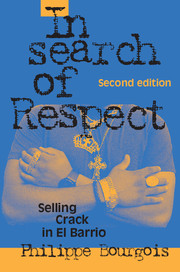Book contents
- Frontmatter
- Contents
- Acknowledgments
- Preface to the 2003 Second Edition
- Introduction
- 1 Violating Apartheid in the United States
- 2 A Street History of El Barrio
- 3 Crackhouse Management: Addiction, Discipline, and Dignity
- 4 “Goin Legit”: Disrespect and Resistance at Work
- 5 School Days: Learning to be a Better Criminal
- 6 Redrawing the Gender Line on the Street
- 7 Families and Children in Pain
- 8 Vulnerable Fathers
- 9 Conclusion
- Epilogue
- Epilogue 2003
- Notes
- Bibliography
- Index
- Other books in the series
2 - A Street History of El Barrio
Published online by Cambridge University Press: 05 June 2014
- Frontmatter
- Contents
- Acknowledgments
- Preface to the 2003 Second Edition
- Introduction
- 1 Violating Apartheid in the United States
- 2 A Street History of El Barrio
- 3 Crackhouse Management: Addiction, Discipline, and Dignity
- 4 “Goin Legit”: Disrespect and Resistance at Work
- 5 School Days: Learning to be a Better Criminal
- 6 Redrawing the Gender Line on the Street
- 7 Families and Children in Pain
- 8 Vulnerable Fathers
- 9 Conclusion
- Epilogue
- Epilogue 2003
- Notes
- Bibliography
- Index
- Other books in the series
Summary
[East Harlem is] a nursery of all kinds of law-breakers; there are nests of narcotics, thieving, stealing, cheating and every conceivable kind of lawbreaking. The country is flooded with criminals from here. A taxi driver would not dare go through 113th Street east of Second Avenue after dark: an armored car would be the only thing safe.
Catholic priest, 1930sThe intimate details of the lives of the crack dealers and their families revealed in this book cannot be understood in a historical vacuum. Second- and third-generation Puerto Rican immigrants in New York City need to be placed in the context of their grandparents' and greatgrandparents' oppressive colonial history. The strategic physical location of the island of Puerto Rico in the middle of the Caribbean at the very heart of the most important trans-Atlantic shipping routes has always made world superpowers covet the territory jealously – almost ever since Christopher Columbus first set foot on the Island in 1493 and Ponce de Leon conquered it in 1508. Dogmatic strategic-military concerns that have nothing to do with economic logic or with the welfare of Puerto Rico's residents have arbitrarily distorted the political and economic administration of the Island for almost five hundred years. Although the original Spanish conquerors imported African slaves and established sugar cane plantations, Puerto Rico was never an economically profitable colony. It was always, above all, a locus for military control; hence the reactionary tenacity with which Spain held on to the territory through the entire nineteenth century, long after the rest of the Americas had been decolonized in the 1820s.
- Type
- Chapter
- Information
- In Search of RespectSelling Crack in El Barrio, pp. 48 - 76Publisher: Cambridge University PressPrint publication year: 2002
- 4
- Cited by

